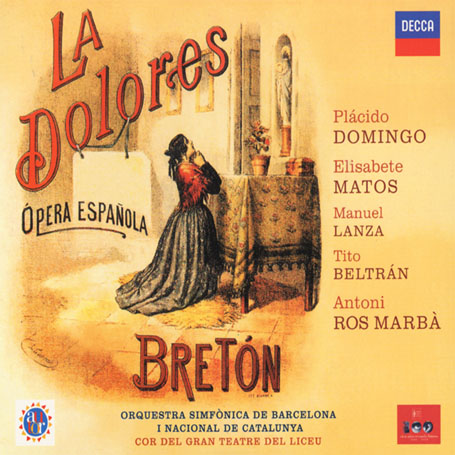Bréton La Dolores
This work, though slow to warm up, is a great advocate for Spanish opera and finds Domingo and colleagues in fine voice
View record and artist detailsRecord and Artist Details
Composer or Director: Tomás Bretón
Genre:
Opera
Label: Decca
Magazine Review Date: 2/2000
Media Format: CD or Download
Media Runtime: 154
Mastering:
DDD
Catalogue Number: 466 060-2DHO2

Tracks:
| Composition | Artist Credit |
|---|---|
| (La) Dolores |
Tomás Bretón, Composer
Antoni Ros Marbà, Conductor Badalona Children's Maîtrise Barcelona Symphony Orchestra Barcelona Teatro Liceo Chorus Elisabete Matos, Dolores, Soprano Enrique Baquerizo, Patricio, Baritone Estefano Palatchi, Sergeant Rojas, Bass Manuel Lanza, Melchor, Tenor Plácido Domingo, Lázaro, Tenor Raquel Pierotti, Gaspara, Soprano Santiago Calderon, Singer, Tenor Santiago Calderon, Mule Driver, Tenor Tito Beltrán, Celemin Tomás Bretón, Composer |
Author: Lionel Salter
The assertion by a Spanish music historian in the 1880s that 'Spanish opera does not exist, and never has' was as contrary to fact as the notorious jibe that England was a 'Land ohne Musik': in that very decade 29 new Spanish operas, or quasi-operas, were created. One of the most vigorous campaigners for a native opera was the highly trained Tomas Breton, who followed up his Los amantes de Teruel (1889) with La Dolores in 1895, which in that one year clocked up 112 consecutive performances in Barcelona alone. (Breton had meanwhile written the enormously popular zarzuela La verbena de la paloma.) La Dolores was hailed as 'Spanish through and through - plot, characters, setting, music picturesque, and folkloric scenes'. The veristic but somewhat awkwardly organised action centres on the rivalry of a peasant, a wealthy farmer, a braggart army sergeant (whose entry, as in Carmen, is heralded by a swarm of urchins) and Lazaro, a young man intended for the priesthood (who also happens to be skilful in the bullring), for the hand of Dolores, a serving girl at an inn, whose favours have in fact already been enjoyed by Melchor, a barber: the story ends violently with the seminarist killing the malevolent Melchor. In the course of this there are folk-songs, folk-instrument ensembles, an (off-stage) bullfight, and dancing: the passacaille and the brilliant jota at the end of Act 1 were universally acclaimed.
It has to be said that the opera takes its time to settle down musically, owing to a conventional opening crowd scene and then protracted brief exchanges between characters which result in a bitty effect; it does not really gel until the Act 1 confrontation between Dolores and Melchor (who, in echo of Iago, declares 'this is how God made me, cruel and violent, fearless and faithless') ; Breton's dramaturgical weakness is also responsible for an excess of single-line dialogue exchanges in Act 3 (which is preceded by a meditative orchestral prelude). But in Act 2 the music really gets into its stride, with a more continuous course and with noteworthy arias for all the main characters (beginning with Lazaro's 'Henchido de amor santo') : not until 17 minutes into Act 3 is there further sustained lyricism in a big aria for Dolores, an ecstatic love scene with Lazaro and an altercation with Melchor.
The performance is a spirited one and, with the small reservation that some of the asides needed to be more differentiated from normal delivery, is almost irreproachable, with an exemplary cast (all with splendidly clear words) and a well-trained chorus and orchestra. Attention is bound to focus on Domingo, who is in fine voice; but this is not a case of a star singer surrounded by lesser artists - all are worthy partners, who besides technical accomplishment bring a sense of characterisation to their parts. If previous recordings of Spanish stage works had attained this standard of quality there could have been a better understanding of a musical area still largely unappreciated in this country.'
It has to be said that the opera takes its time to settle down musically, owing to a conventional opening crowd scene and then protracted brief exchanges between characters which result in a bitty effect; it does not really gel until the Act 1 confrontation between Dolores and Melchor (who, in echo of Iago, declares 'this is how God made me, cruel and violent, fearless and faithless') ; Breton's dramaturgical weakness is also responsible for an excess of single-line dialogue exchanges in Act 3 (which is preceded by a meditative orchestral prelude). But in Act 2 the music really gets into its stride, with a more continuous course and with noteworthy arias for all the main characters (beginning with Lazaro's 'Henchido de amor santo') : not until 17 minutes into Act 3 is there further sustained lyricism in a big aria for Dolores, an ecstatic love scene with Lazaro and an altercation with Melchor.
The performance is a spirited one and, with the small reservation that some of the asides needed to be more differentiated from normal delivery, is almost irreproachable, with an exemplary cast (all with splendidly clear words) and a well-trained chorus and orchestra. Attention is bound to focus on Domingo, who is in fine voice; but this is not a case of a star singer surrounded by lesser artists - all are worthy partners, who besides technical accomplishment bring a sense of characterisation to their parts. If previous recordings of Spanish stage works had attained this standard of quality there could have been a better understanding of a musical area still largely unappreciated in this country.'
Discover the world's largest classical music catalogue with Presto Music.

Gramophone Digital Club
- Digital Edition
- Digital Archive
- Reviews Database
- Full website access
From £8.75 / month
Subscribe
Gramophone Full Club
- Print Edition
- Digital Edition
- Digital Archive
- Reviews Database
- Full website access
From £11.00 / month
Subscribe
If you are a library, university or other organisation that would be interested in an institutional subscription to Gramophone please click here for further information.




